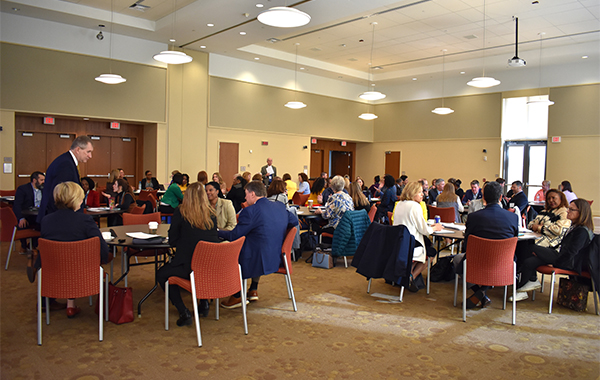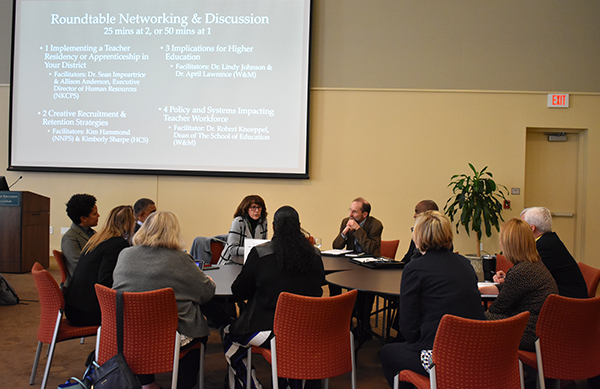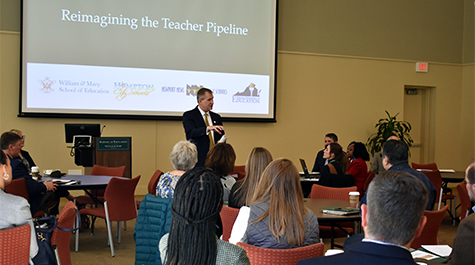School of Education hosts regional Teacher Pipeline Summit
The William & Mary School of Education convened a summit March 9 to explore how to build and sustain Virginia’s teacher pipeline.
The regional summit to discuss and develop “grow your own” teacher pathways in the Peninsula region fulfilled a stated goal of a Virginia Department of Education planning grant to examine implementing a teacher apprenticeship program on the Peninsula. The grant was received by the School of Education in collaboration with Hampton City Schools and Newport News Public Schools.
The summit brought together diverse stakeholders, including W&M Board of Visitors member Ardine Williams, school principals and superintendents, representatives from higher education institutions and from across the Peninsula to collaborate and wrestle with how to grow and sustain the teacher pipeline to meet the critical teacher shortage in Virginia.
 “The summit provided a unique opportunity to bring our partners and community stakeholders together to grapple with how we can ensure that every child has a highly qualified teacher in their classroom,” said Lindy Johnson, W&M associate professor and chair of curriculum & instruction.
“The summit provided a unique opportunity to bring our partners and community stakeholders together to grapple with how we can ensure that every child has a highly qualified teacher in their classroom,” said Lindy Johnson, W&M associate professor and chair of curriculum & instruction.
“I am grateful for our partners and their willingness to think creatively and innovatively with us about how we can solve the grand challenge of the teacher shortage in the commonwealth.”
Steve Staples, W&M executive adjunct professor of educational policy, planning, & leadership and former Virginia superintendent of public instruction, moderated the summit. W&M School of Education Dean Robert Knoeppel gave opening remarks.
The summit connects to School of Education high-level priorities connected to W&M’s Vision 2026 strategic plan, Knoeppel said. Those include cultivating partnerships, championing equity and informing innovation and transformation.
“Through partnerships we will address the critical shortage of teachers …” Knoeppel said. “We know that equity is achieved when all children are given access. … Our work together today is innovative and it will help us transform the future of education.”
Guest speakers were Dave Myers, VDOE chief information officer and assistant superintendent of data, research, and technology; Joan Johnson, VDOE assistant superintendent of teacher education and licensure; and Sean Impeartrice, chief academic officer of Clarksville-Montgomery County School System in Tennessee.
Myers discussed the teacher shortage crisis and teacher and leader retention based on data the VDOE has collected as well as surveys and research conducted by Luke Miller, research associate professor at the University of Virginia School of Education and Human Development.
Johnson described in detail the Virginia Teacher Apprenticeship Initiative. Impeartrice gave a rundown on the first teacher apprenticeship in Tennessee.
 Afternoon roundtable discussions were conducted on four topics.
Afternoon roundtable discussions were conducted on four topics.
A small group session with Impeartrice allowed participants to ask logistical questions about implementing a teacher apprenticeship program in their own school districts.
Another group brainstormed creative ideas to recruit and retain teachers. Participants shared the barriers they are seeing in their contexts and discussed what types of innovations are necessary to remove them with experts Kim Hammond and Kim Sharpe, who work in recruiting, training, and retaining qualified teachers in Hampton and Newport News.
Johnson and April Lawrence, director of field & clinical experiences at W&M School of Education, facilitated a dialogue on how higher education can adapt and evolve to the changing landscape in teacher education and how to partner with community colleges and K-12 schools to ensure a diverse teacher pipeline.
“Anyone who cares about public education in Virginia should be paying close attention to the teacher pipeline in our region,” Lawrence said. “This is an all-hands-on-deck moment. The summit provided an opportunity for leaders in our region who work in teacher training, recruitment, and retention to come together to discuss the critical teacher shortage, and to brainstorm strategies for filling the vacancies in our partner school divisions.
“We know that we must do a better job investing in public education by funding and supporting teachers, and that we must adapt teacher education programs to meet the needs of working professionals.”
Knoeppel moderated a group that focused on broader issues impacting the educational landscape and teacher workforce such as policies to influence teacher recruitment and retention across the state and rethinking teacher compensation, support and professional development.
